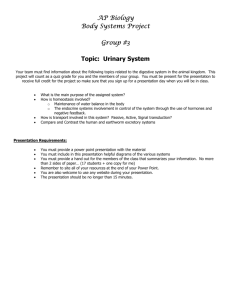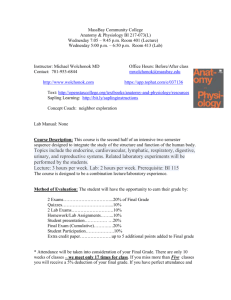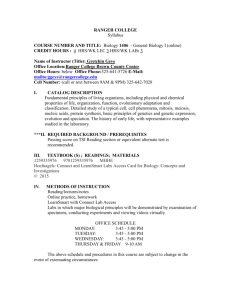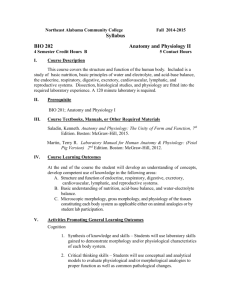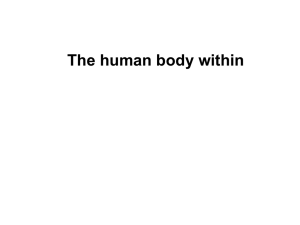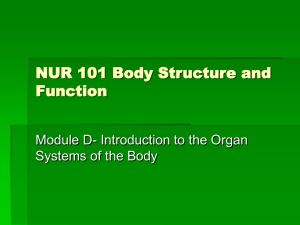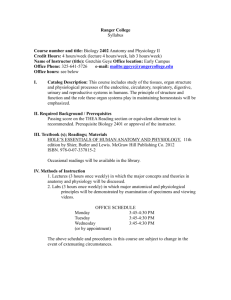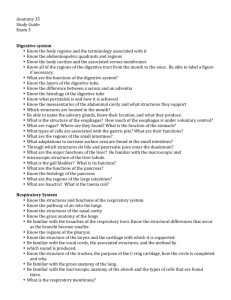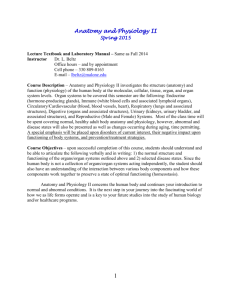BIOL 2402 - Ranger College
advertisement
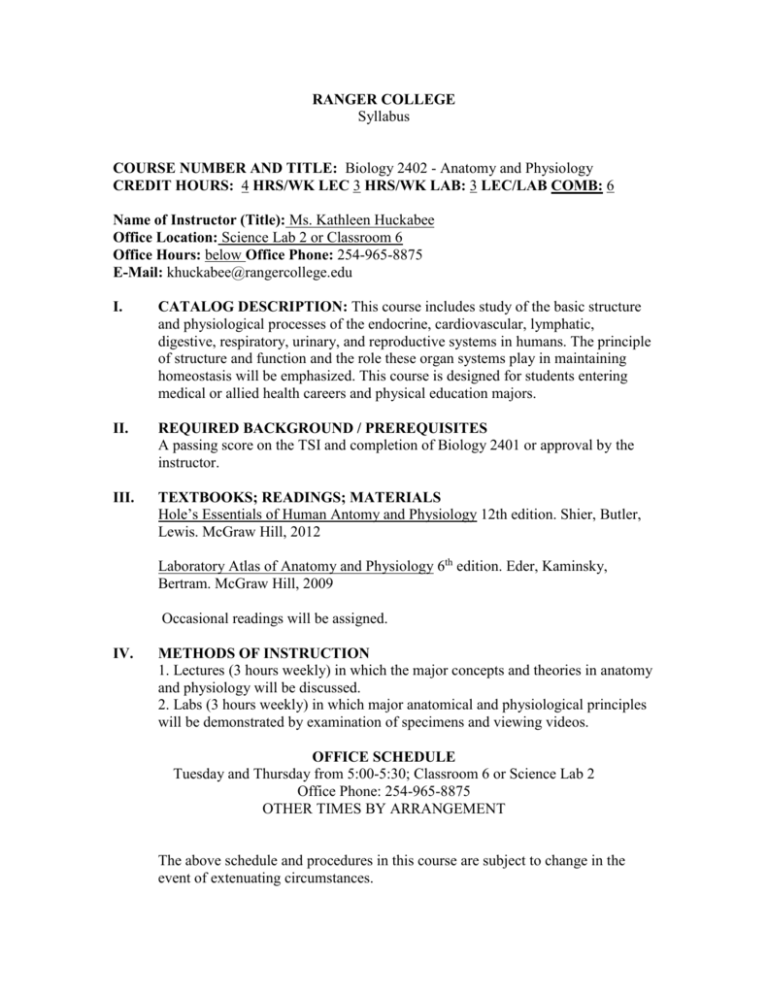
RANGER COLLEGE Syllabus COURSE NUMBER AND TITLE: Biology 2402 - Anatomy and Physiology CREDIT HOURS: 4 HRS/WK LEC 3 HRS/WK LAB: 3 LEC/LAB COMB: 6 Name of Instructor (Title): Ms. Kathleen Huckabee Office Location: Science Lab 2 or Classroom 6 Office Hours: below Office Phone: 254-965-8875 E-Mail: khuckabee@rangercollege.edu I. CATALOG DESCRIPTION: This course includes study of the basic structure and physiological processes of the endocrine, cardiovascular, lymphatic, digestive, respiratory, urinary, and reproductive systems in humans. The principle of structure and function and the role these organ systems play in maintaining homeostasis will be emphasized. This course is designed for students entering medical or allied health careers and physical education majors. II. REQUIRED BACKGROUND / PREREQUISITES A passing score on the TSI and completion of Biology 2401 or approval by the instructor. III. TEXTBOOKS; READINGS; MATERIALS Hole’s Essentials of Human Antomy and Physiology 12th edition. Shier, Butler, Lewis. McGraw Hill, 2012 Laboratory Atlas of Anatomy and Physiology 6th edition. Eder, Kaminsky, Bertram. McGraw Hill, 2009 Occasional readings will be assigned. IV. METHODS OF INSTRUCTION 1. Lectures (3 hours weekly) in which the major concepts and theories in anatomy and physiology will be discussed. 2. Labs (3 hours weekly) in which major anatomical and physiological principles will be demonstrated by examination of specimens and viewing videos. OFFICE SCHEDULE Tuesday and Thursday from 5:00-5:30; Classroom 6 or Science Lab 2 Office Phone: 254-965-8875 OTHER TIMES BY ARRANGEMENT The above schedule and procedures in this course are subject to change in the event of extenuating circumstances. V. CORE OBJECTIVES Through the Core Curriculum, students will gain a foundation of knowledge of human cultures and the physical and natural world; develop principles of personal and social responsibility for living in a diverse world; and advance intellectual and practical skills that are essential for all learning. *Core Objectives stressed in Life Sciences. *Critical Thinking Skills *Communication Skills *Empirical and Quantitative Skills *Teamwork Social Responsibility Personal Responsibility VI. COURSE OBJECTIVES Biology 2402 is designed to instruct students in methods that will result in a student who is able to: 1. Describe the structure and function of the endocrine system, (N-1, N-2) (B-1, B-4, B-5) 2. Describe the structure and function of the cardiovascular system, (N-1, N-2) (B-1, B-4, B-5) 3. Describe the structure and function of the lymphatic system, (N-1, N-2) (B-1, B-4, B-5) 4. Describe the structure and function of the respiratory system, (N-1, N-2) (B-1, B-4, B-5) 5. Describe the structure and function of the digestive system, (N-1, N-2) (B-1, B-4, B-5) 6. Describe the structure and function of the urinary system, (N-1, N-2) (B-1, B-4, B-5) 7. Describe the structure and function of the reproductive system. (N-1, N-2) (B-1, B-4, B-5) In order to evaluate the progress in achieving the course objectives, each student will respond on written exams to questions in the following areas: - Describe the functional relationship between the endocrine system and the nervous system. - Describe the production, release, transportation and target tissue of the hormones produced by the endocrine system. - List the endocrine glands and the hormones each produces. - Describe the response of the target tissue to the specific hormones discussed in class. - List the functions of the blood and describe the composition of blood plasma. - Describe the origin, function and structure of the formed elements of blood. - Describe the external and internal anatomy of the heart. - Explain the events of the cardiac cycle. - Describe the structure and function of arteries, capillaries and veins. - Describe the pattern of circulation of blood through the body. - Describe the factors that control the movement of blood through the cardiovascular system. - Explain the three primary functions of the lymphatic system. - Explain how lymph is formed and transported. - Describe the structure of lymph vessels, nodules and nodes, spleen and thymus. - List the structures that compose the respiratory passages. - List the tissues that form each structure of the respiratory passages. - Describe the structure of the alveoli or terminal respiratory units. - Explain how contraction of the respiratory muscles causes pulmonary ventilation. - List the structures that form the digestive tract and the tissues that form each of these structures. - Explain the mechanism that moves food through the digestive tract. - List the accessory digestive glands and their secretions. -Describe the process of chemical digestion and absorption. - List the components of the urinary system and the function of each. - Describe the tissue structure of the kidney. - Explain the countercurrent multiplier mechanism for concentration of urine. - Describe the structure and function of nephrons. - List the components of the male reproductive tract that produce and deliver sperm. - Describe the production and development of sperm. - Describe the hormonal control of the male reproductive system. - List the components of the female reproductive tract that produce, deliver and support the egg. - Describe the production and development of eggs. - Describe the hormonal control of the female reproductive system. - Describe the events that lead to fertilization and development of the egg. VII. COURSE CALENDAR (see attachments) VIII. COURSE / CLASSROOM POLICIES Regular and punctual attendance in all classes and labs is considered essential for optimum academic success. If the student has the equivalence of three weeks of unofficial absences... the instructor may drop the student from the course with a grade of F (Ranger College General Catalog). Students are expected to be seated by the beginning of the lecture period. Excessive tardies (6) may be considered as absences. Excessive unexcused absences (6) may result in a grade of I (incomplete) and may result in dismissal from the course with a grade of F. It is your responsibility to inform the instructor of an excused absence. An absence is excused if you are excused by the Dean to participate in an authorized College activity. Any student who is disruptive to the class will be dismissed from the class and may be dismissed from the course. Any student found with unauthorized notes (cheat sheets, electronic devices, etc.) during an exam or copying from another student's exam will be subject to disciplinary action. Any student misconduct will be reported to the Dean of Student Services. Please do not bring cell phones, pagers or similar devices to class or be sure they are turned off. No tobacco use is permitted in the science building. ADA Statement: Ranger College provides a variety of services for students with learning and/or physical disabilities. The student is responsible for making the initial contact with the Ranger College Counselor. It is advisable to make this contact before or immediately after the semester begins. IX. ASSESSMENT (Grading Procedure) Exams will consist primarily of multiple choice, fill-in-the-blank, and short answer questions and will cover all material discussed since the last exam. Each question will be graded as correct or incorrect in accordance with information in the text and lectures. Exam grades will be taken as the number of points correct. No make-up exams, labs, or assignments will be given unless a doctor’s note is provided or prior arrangements have been made with the instructor. Students missing lectures are responsible for getting notes from the instructor or classmates. There will be a 5 point deduction from the attendance category for each absence. The course grade will be calculated as follows: Lecture exams 133 points each = 400 points Lab Practicals 100 points each = 200 points Attendance = 100 points Labs 20 points each = 100 points Final Exam = 200 points Total = 1000 points Letter grades will be assigned as follows: 900-1000=A, 800-900=B, 700-800=C, 600-700=D, below 600=F X. XI. ADMISSIONS, EMPLOYMENT, AND PROGRAM POLICIES OF RANGER COLLEGE ARE NONDISCRIMINATORY IN REGARD TO RACE, CREED, COLOR, SEX, AGE, DISABILITY, AND NATIONAL ORIGIN. RECEIPT OF SYLLABUS (see attachments) BIOLOGY 2402 - ANATOMY AND PHYSIOLOGY Text: Hole’s Essentials of Human Antomy and Physiology 12th edition. Shier, Butler, Lewis. McGraw Hill, 2012 Lab Manual: Laboratory Atlas of Anatomy and Physiology 6th edition. Eder, Kaminsky, Bertram. McGraw Hill, 2009 Tentative Schedule CLASS LECTURE TOPIC 1 Endocrine System 2 Endocrine System 3 Blood and Blood Vessels 4 Blood and Blood Typing 5 Circulatory System and Heart Anatomy 6 Circulatory System and Heart Anatomy 7 Lab Practical #1 8 Online assignment – Lymphatic System 9 Lymphatic System, review for Test #1 10 Test #1 11 Digestive System and Lab 12 Digestive System and Lab 13 Digestive System and Lab 14 Respiratory System 15 Respiratory System and Spirometry 16 Respiratory System and Review 17 Test #2 18 Urinary System 19 Urinary System and Lab 20 Urinary System and Lab 21 Urinary System and Lab 22 Male Reproductive System and Lab 23 Male Reproductive System and Lab 24 Female Reproductive System and Lab 25 Lab Practical #2 26 Pregnancy, Growth, and Development 27 Test #3 28 Final Exam Review 29 Final Exam (Comprehensive) **** Periodic online assignments will be assigned TEXT ASSIGNMENT Ch. 11 Ch. 12 Ch. 13 Ch. 14 Ch. 15 Ch. 16 Ch.17 Ch. 19 Ch. 20 RECEIPT OF SYLLABUS I have received, and I understand, the information in the syllabus for Biology 2402 and I agree to abide by the stated policies. This includes the use of electronic devices in the class room. I also understand the process for calculating my course grade. Name: (Print) __________________________________ Date:___________ (Sign)__________________________________ (Ranger email) __________________________ (cell phone) _____________________________
